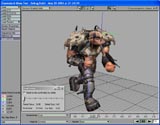| |
|
|
| |
 |
|
| |
The
ShowTool Interface (see examples section)
|
|
|
|
| |
|
| |
|
| |
|
|
Currently in development, Gnometech's ShowTool for
the Torque
Engine allows the user to view their DTS objects
to ensure they have been correctly exported. It is presently
being alpha tested at a major indie game studio. See
the Examples section
for more images.
The current version supports the following, with more
features continually being added:
- Loading of multiple DTS objects into their own view.
DSQ files may be loaded individually or through a
standard .cs file to import multiple animation sequences
at once. A list of the last five loaded objects is
available.
- Multiple rendering formats: textured shaded, untextured
shaded, flat shaded, textured wireframe, front face
wireframe, wireframe, vertices, and bounding boxes.
- User selectable bitmap for environmental mapping.
- The light source may be moved around with the mouse
in a 'trackball'-like fashion, or turned off for unobstructed
viewing of the applied textures.
- The current texture mip map level may be changed
at any time with a key press.
- Textures may be flushed and reloaded with a key
press.
- All material properties are displayed in the Material
List window.
- A user definable grid at 'ground level'
- The view background may be a solid colour (selected
from a list or user defined) or a bitmap. A snapshot
of a game's level could be used as the background.
- All nodes and their parental links may be shown.
- When a node is selected, its world position and
rotation are shown as well as a graphical representation
of the node's axis.
- Individual object bounding boxes (rendered solid
or wireframe) and collision meshes may be displayed.
- Any loaded object may be mounted to any node on
another object.
- Levels of detail may be manually selected or automatically
displayed as they would in game.
- Animation sequences may be played forwards or backwards
at a user defined time scale. The sequence may also
be scrubbed through using the animation slider control.
- All animation sequence attributes may be viewed
using the Sequence Info window.
More features are on the way!
|
